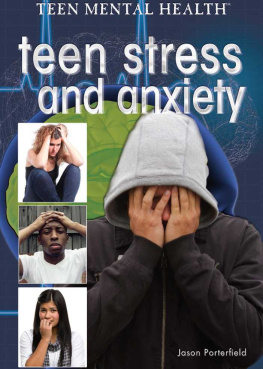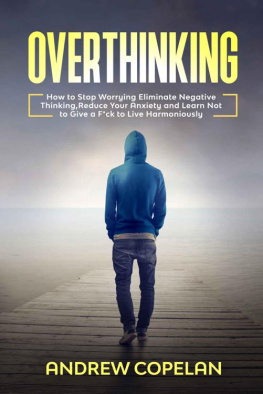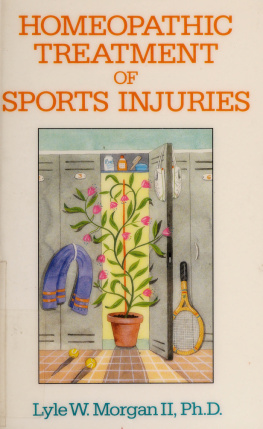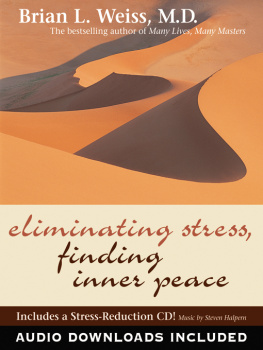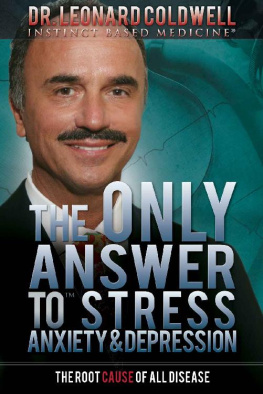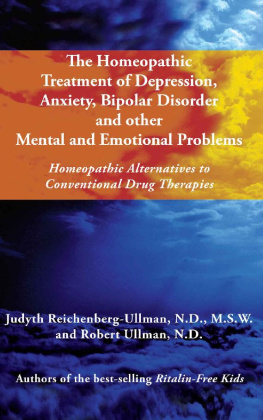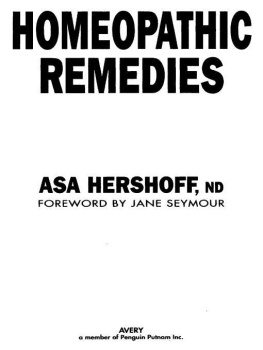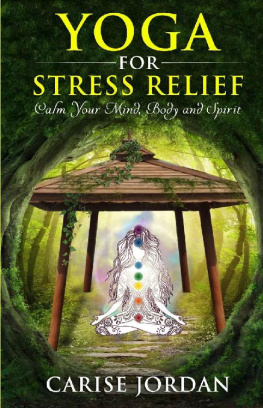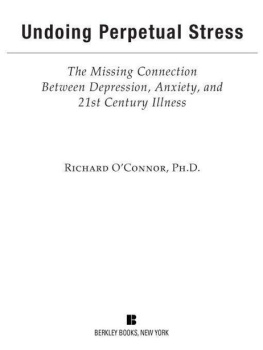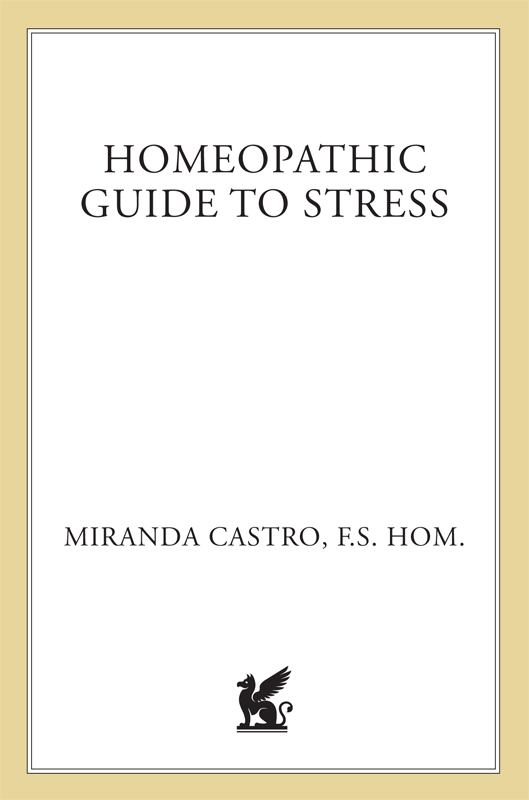Contents
Guide

The author and publisher have provided this e-book to you for your personal use only. You may not make this e-book publicly available in any way. Copyright infringement is against the law. If you believe the copy of this e-book you are reading infringes on the authors copyright, please notify the publisher at: us.macmillanusa.com/piracy.
Contents
It is advisable to seek the guidance of a physician before implementing the approach to health suggested in this book. It is essential that any reader who has any reason to suspect that he or she suffers from illness check with his or her doctor before attempting to treat it with this method. Neither this nor any other book should be used as a substitute for professional medical care or treatment.
For Jeremy
The stress of writing books in addition to being a homeopath, a single parent and human being have stretched me, at times, to my limits. I joined a town choir and found that singing twice a week released some of that strain, and created more physical relaxation, more inner joy and more peace than ten hot baths or a day on the Yorkshire moors. It took me forty-two years to find a way to sing the notes that rattled around in my head! Because my life is (willingly) rather stressful, singing is the first place I look to when I become over-stressed or need a massage for my body and my soul.
I would like to thank the following friends, family and colleagues for their encouragement, feedback, input, support (moral and otherwise!) and, of course, for their part in alleviating the stress of writing this book: Barbara Levy, Daniel, Ellen Goldman, Joy Chang, Hazel Orme, John Morgan, Mary Clarke, Jeanne Ellin, Jeremy Castro, Maggi Sikking, Mike Jackson, Miranda Walsh, Rachel Packer, Rob Barker, Rosie, Sue Morrison, all at the Society of Homeopaths office, Victoria Pryor, and finally, all at Macmillan UK.
Seattle, Washington, USA
February 1996
The goal of this book is to enable you to use homeopathic medicines safely and effectively so that you can treat some common stresses and stress-related complaints after consulting with your medical professional. I hope it will also encourage you to enter into a lively, on-going relationship with your own stress responses, by understanding them within a holistic, homeopathic framework.
Understanding stress
This section discusses some common stress responses, suggests ways to identify stressful areas in your life and outlines steps to take in order to deal with them.
Understanding homeopathy
This chapter looks at the history and principles of homeopathy, and ends with twenty cases from my practice which bring the theory to life.
Emotional and physical stresses
These sections focus on specific stresses, including practical advice for avoiding a particular stress and/or working with it, as well as a brief discussion of homeopathic solutions.
Homeopathic remedies
This part describes forty-three common homeopathic remedies for acute or recent stresses. Each one describes the emotional and general state, as well as some common physical symptoms.
Stress indexes
You can use these as a short cut once you become familiar with the pictures outlined above. Or you may want to look up a particular stress or symptom in order to see which remedies are appropriate.
Appendices
Here you will find stress charts to help you work out how stressed you may be, as well as a glossary of terms and a list of books and organizations.
When I first discovered homeopathy I felt as if I had come home. One of the main reasons for this feeling was that my homeopath took a wide view of stress, one I hadnt experienced or heard of in any other medical discipline. It was such a relief to know that there was a place where medical professionals not only saw that each individual was unique, with particular strengths and weaknesses, but that each person was potentially vulnerable to different stresses, or would at least respond in their own way to different stresses whether they were physical, mental or emotional. This made tremendous sense to me.
In my early years in practice, however, I found myself somewhat perplexed when patients would tell me at the beginning of a consultation that they had come to see me because they were stressed, or because their doctors had diagnosed them as having stress. I would ask them to tell me more and I would also ask what they meant by the word stress. Some of these patients would look at me somewhat suspiciously, even irritably, as if to say: What kind of homeopath are you? Dont you know what stress is? And they would repeat their original statement, but speaking a little slower this time, as if they were talking to someone whose first language was not English. Some patients would go into a lengthy explanation about stress, in a genuine attempt to educate me. Others would shrug their shoulders and look at me baffled as if to say: Well, if you dont know what I mean then I certainly dont.
In the past, doctors who were having difficulty helping certain patients would often, if all tests came back negative, make a diagnosis of psychosomatic illness. They might add that the patient had to learn to live with their complaint, that there was nothing they could do. This has always seemed to me to be a rather cruel blow to deal to those who may be running out of hope anyway.
Then there came a time when the diagnosis changed to stress. It was an easier word to say (and spell!) and tripped off everyones tongues without any trouble whatsoever. Doctors now added that the patient had to learn to live with their complaint, that there was little advice they could offer except, maybe, to learn to relax.
The trouble is that stress, like psychosomatic illness, is almost completely meaningless as a diagnosis. It is like taking your beloved car to the garage, saying that it has a worrying knocking sound every time you brake hard, and that you have noticed some other peculiar symptoms as well. Your mechanic takes a close look and performs many sensible tests but is not able to find what ails it. He then hands it back to you saying that he cannot therefore treat it, and you will have to live with it. You know that it is just a question of time before something goes wrong. Your mechanic knows it too, but neither of you say anything. You dont want to make your mechanic feel bad, especially since he has done his best to uncover the cause of the problem.
It has been suggested that the human body is like a car. That we have to attend to it with the same degree of loving care and attention. If only it were that simple! We cannot take it apart, lay all the parts out on the garage floor, clean them and put them back together again. We cannot easily replace parts that have become damaged. And we do not run on fuel alone. Our vitality and our energetic processes are not fully understood. The sheer complexity of the human body should be listed as one of the seven wonders of the world.
Any system of medicine that seeks to treat the human body as a mechanical object is going to be limited in terms of its ability to offer serious healing. Patients have learned to rely on doctors more as mechanics than anything else presenting a straightforward complaint and expecting and getting a simple solution which treats the complaint (a prescription). The problems start when the complaints become more complicated and do not respond to standard drug treatment.


